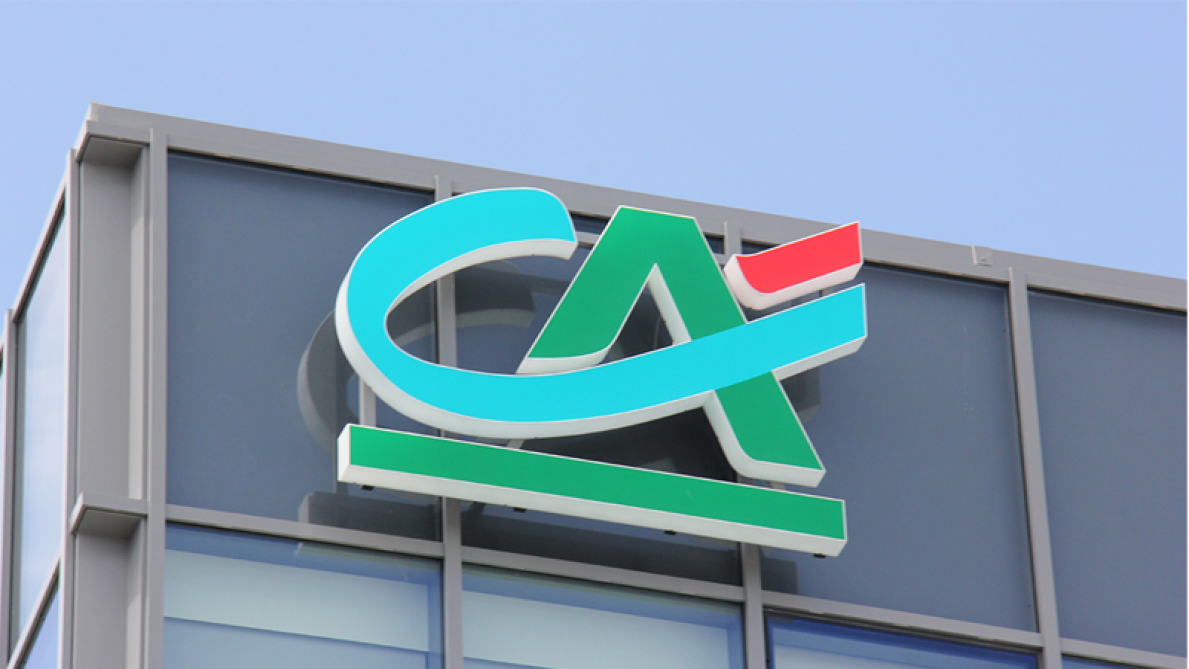(BFM Bourse) – The American bank lowered its advice on the listed structure of the mutual bank to “sell” against “hold” previously. It estimates that the group will experience a less favorable evolution of its earnings per share than its comparable companies, with also a lower return to the shareholder.
Crédit Agricole SA has had a rather good year on the stock market so far, with its share price up 15.8% since January 1 against 12% for the CAC 40 over the same period. The listed structure of the mutual bank has also been one of the big winners in recent publication seasons (first quarter then first half). After unveiling its accounts for the first six months of 2023, its stock had gained more than 6%. Only STMicroelectronics (+8.9%) had done better within the CAC 40.
However Goldman Sachs believes that it is now time to take its gains for investors. In a note published on Tuesday, the American bank went from “neutral” to “sell” on the value, and reduced its price target to 11.5 euros against 12.6 euros previously.
>> Access our exclusive graphic analyses, and enter into the confidence of the Trading Portfolio
Earnings per share that would settle
Goldman Sachs does not address a really severe grievance against Crédit Agricole SA. The American establishment also notes that the diversified activity of the company, thanks to the famous universal banking model, has enabled it to post a profitability, measured by the ROTE, the return on tangible equity, superior to that of the industry for 10 years. The annual average is 10% against 7% for all the banks covered by Goldman Sachs. Ditto for the growth of its income (+53% for Crédit Agricole SA over the whole of 10 years against +38% for the sector).
Only, Goldman Sachs now believes that there is better to do with other listed banks, to sum up.
According to its projections, Crédit Agricole SA should see its earnings per share fall by an average of 1% over the period 2024-2025, while the average growth in the sector over the period would be 8% (and 7% for European banks as well as than 19% for Societe Generale and 7% for BNP Paribas). This slowdown would be mainly due to the specialized financial services (SFS) division, with in particular weaker activity in consumer credit, according to the American establishment.
However, faced with these less enviable earnings per share prospects, most Crédit Agricole SA (CASA) comparables are trading at more attractive valuation levels.
“When we look at Crédit Agricole SA against its Eurozone peers (…) 90% of its Eurozone peers in our coverage are expected to deliver stronger earnings growth than CASA over the next two years while only 20% of them trade with higher trading multiples,” Goldman Sachs said.
A lower shareholder return
The bank notes that CASA displays a solid capital ratio, thanks in particular to the solvency ratio of the Crédit Agricole Group (17.6% at the end of June), knowing that it is indeed at the level of the parent company that the regulators appreciate this solvency.
But Goldman Sachs stresses that the return to Crédit Agricole SA shareholders should be below the industry average. For 2024, it expects European banks to pay a dividend representing a yield of 7.6%, to which is added 3.6% of share buybacks for a total of around 11%.
While CASA’s dividend yield would be average (7.2%), Goldman Sachs does not expect the French bank to buy back shares in 2024 and 2025. As a result, its return to shareholder would be one of the lowest in the industry.
On the Paris Stock Exchange, the Crédit Agricole SA share lost 2% around 3 p.m., posting the second largest drop in the CAC 40. Insofar as the market is bearish (the CAC 40 gives up 0.2%) and that the recommendations for sale are rare and often penalize the shares quoted, the value shows a rather remarkable resilience.
The fact that Crédit Agricole SA has a less attractive valuation than other banks is relatively consensus among analysts. “Compared to other French banks, the potential for rerating (appreciation of stock market multiples, editor’s note) is more limited,” noted Jefferies last month.
Julien Marion – ©2023 BFM Bourse
Are you following this action?
Receive all information about CREDIT AGRICOLE in real time:
